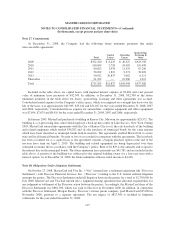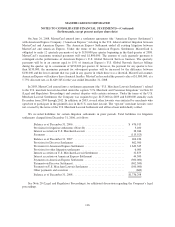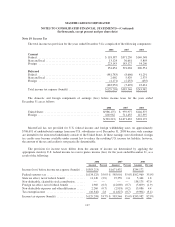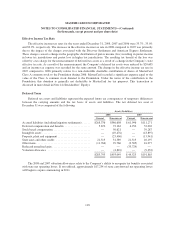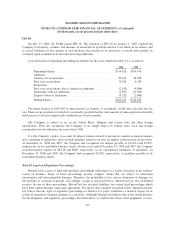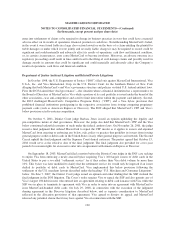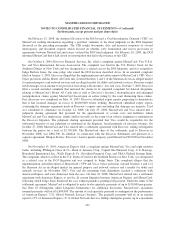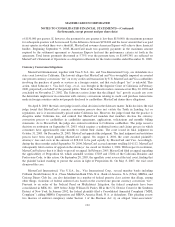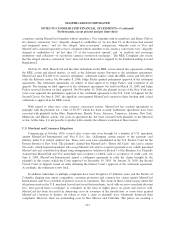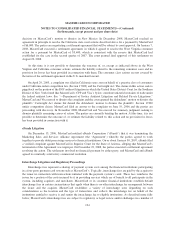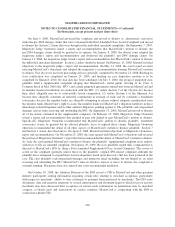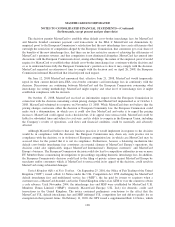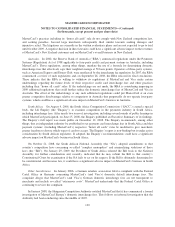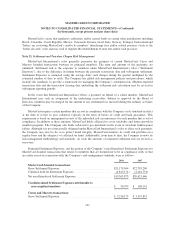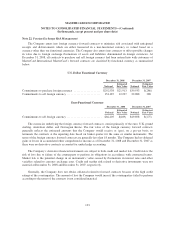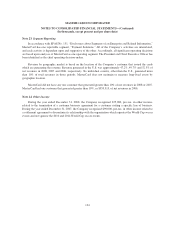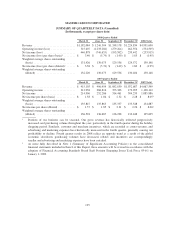MasterCard 2008 Annual Report Download - page 135
Download and view the complete annual report
Please find page 135 of the 2008 MasterCard annual report below. You can navigate through the pages in the report by either clicking on the pages listed below, or by using the keyword search tool below to find specific information within the annual report.MASTERCARD INCORPORATED
NOTES TO CONSOLIDATED FINANCIAL STATEMENTS—(Continued)
(In thousands, except percent and per share data)
jurisdictions. At this time, it is not possible to determine the ultimate resolution of, or estimate the liability
related to, any of the interchange proceedings described below. No provision for losses has been provided in
connection with them.
United States. On October 8, 2004, a purported class action lawsuit was filed by a group of merchants in
the U.S. District Court for the Northern District of California against MasterCard International, Visa U.S.A., Inc.,
Visa International Corp. and several member banks in California alleging, among other things, that MasterCard’s
and Visa’s interchange fees contravene the Sherman Act and the Clayton Act. The plaintiffs seek damages and an
injunction against MasterCard (and Visa) setting interchange and engaging in “joint marketing activities,” which
plaintiffs allege include the purported negotiation of merchant discount rates with certain merchants. MasterCard
moved to dismiss the claims in the complaint for failure to state a claim and, in the alternative, also moved for
summary judgment with respect to certain of the claims. On July 25, 2005, the court issued an order granting
MasterCard’s motion to dismiss and dismissed the complaint with prejudice which plaintiffs have appealed. Oral
argument on the appeal was held on June 11, 2007. On March 7, 2008, the Court of Appeals affirmed the district
court’s dismissal of the complaint. The time in which plaintiffs could file a petition for certiorari with the
Supreme Court has expired.
On June 22, 2005, a purported class action lawsuit was filed by a group of merchants in the U.S. District
Court of Connecticut against MasterCard International Incorporated, Visa U.S.A., Inc. Visa International Service
Association and a number of member banks alleging, among other things, that MasterCard’s and Visa’s
purported setting of interchange fees violates Section 1 of the Sherman Act. In addition, the complaint alleges
MasterCard’s and Visa’s purported tying and bundling of transaction fees also constitutes a violation of Section 1
of the Sherman Act. The suit seeks treble damages in an unspecified amount, attorneys’ fees and injunctive relief.
Since the filing of this complaint, there have been approximately fifty similar complaints (the majority styled as
class actions although a few complaints are on behalf of individual plaintiffs) filed on behalf of merchants
against MasterCard and Visa (and in some cases, certain member banks) in federal courts in California, New
York, Wisconsin, Pennsylvania, New Jersey, Ohio, Kentucky and Connecticut. On October 19, 2005, the Judicial
Panel on Multidistrict Litigation issued an order transferring these cases to Judge Gleeson of the U.S. District
Court for the Eastern District of New York for coordination of pre-trial proceedings in MDL No. 1720. On
April 24, 2006, the group of purported class plaintiffs filed a First Amended Class Action Complaint. Taken
together, the claims in the First Amended Class Action Complaint and in the complaints brought on the behalf of
the individual merchants are generally brought under Sections 1 and 2 of the Sherman Act. Specifically, the
complaints contain some or all of the following claims: (i) that MasterCard’s and Visa’s setting of interchange
fees (for both credit and offline debit transactions) violates Section 1 of the Sherman Act; (ii) that MasterCard
and Visa have enacted and enforced various rules, including the no surcharge rule and purported anti-steering
rules, in violation of Section 1 or 2 of the Sherman Act; (iii) that MasterCard’s and Visa’s purported bundling of
the acceptance of premium credit cards to standard credit cards constitutes an unlawful tying arrangement; and
(iv) that MasterCard and Visa have unlawfully tied and bundled transaction fees. In addition to the claims
brought under federal antitrust law, some of these complaints contain certain unfair competition law claims under
state law based upon the same conduct described above. These interchange-related litigations also seek treble
damages in an unspecified amount (although several of the complaints allege that the plaintiffs expect that
damages will range in the tens of billions of dollars), as well as attorneys’ fees and injunctive relief. On
January 29, 2009, the class plaintiffs filed a Second Consolidated Class Action Complaint. The allegations and
claims in this complaint generally mirror those in the first amended class action complaint described above
although plaintiffs have added additional claims brought under Sections 1 and 2 of the Sherman Act against
MasterCard, Visa and a number of banks alleging, among other things, that the networks and banks have
continued to fix interchange fees following each network’s initial public offering. The time in which MasterCard
can respond to the complaint is currently running.
125


